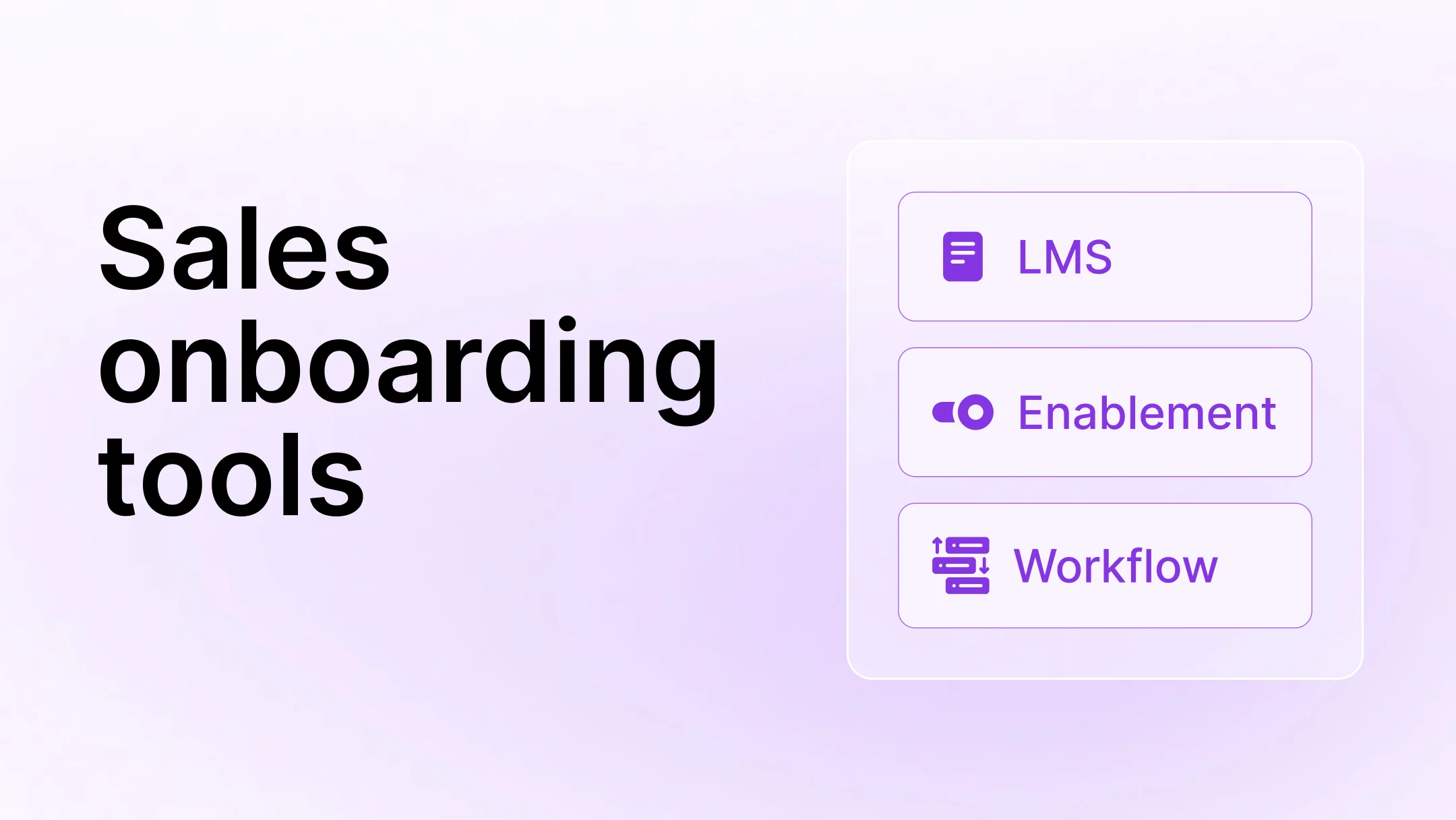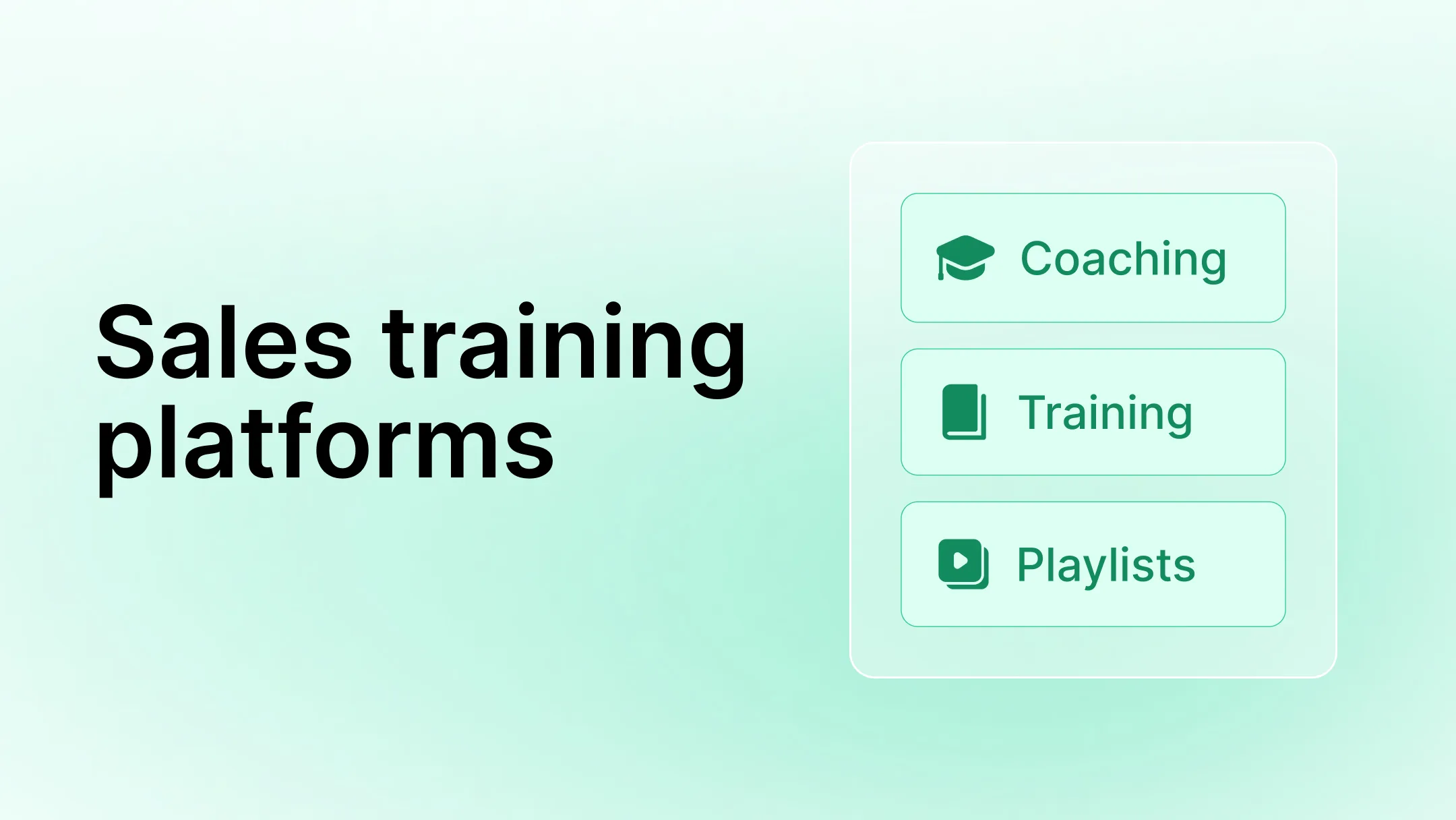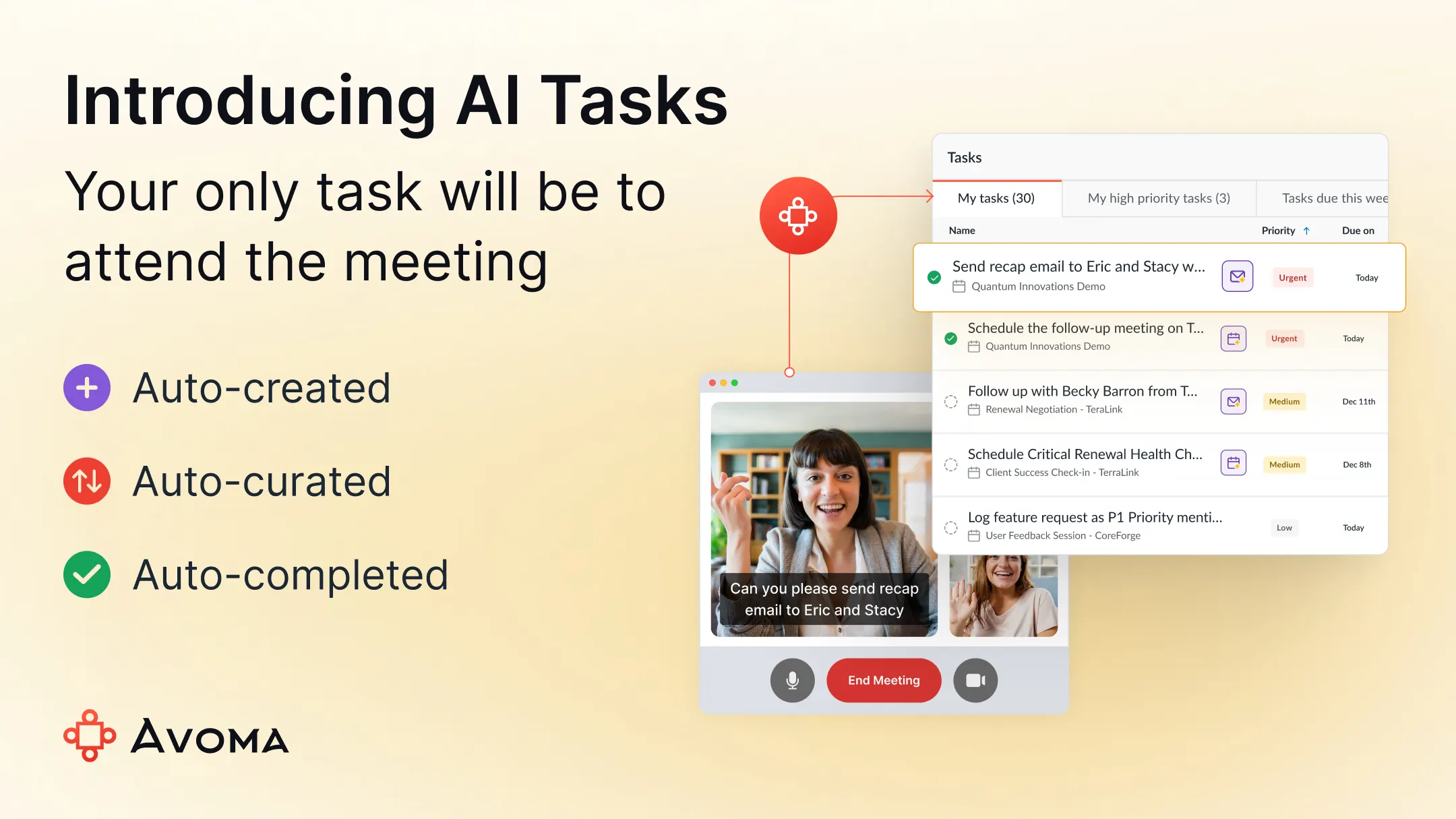How AI note-taking saves sales reps 4+ hours per week
Table of Contents:

Whether you are an account executive or a customer success rep, it feels like your day is just one meeting after another. On one hand, you need to be fully present and engaged in these conversations.
But on the other hand, trying to remember or write down every single detail discussed in those meetings is like trying to hold water in your hands. You’ll probably retain some, but most of it slips straight through your fingers. And if you need to pass it off to someone else, that water dwindles down to a few drops.
This is where AI swoops in to assist. With AI-generated notes and CRM automation, you can stay engaged during those customer-facing interactions, making prospects and customers feel heard and valued, while staying organized and on top of follow-ups.
In this blog, we will dive into how you can use AI to reclaim your time and improve your performance with the magic of AI-generated notes and CRM automation.
The Headache of Manual Note-Taking
One thing about note-taking is that you don’t really understand the chokehold it has on your sales workflows until you really think about it or break it down.
The biggest issues of manual note-taking:
- Eats up a lot of time
- Key details can be easily missed or overlooked
- Siloed to the rep or attendees in that meeting
The "old way" of note-taking - sticky notes, notepads, and never-ending tasks lists just doesn't cut it anymore.
First, most reps simply don't have the time to jot down the amount of detail required to truly gain insights across all customer-facing interactions.
And second, if anyone else in the organization (leaders, product, or marketing) needs details about specific deals or any feedback provided, reps end up having to schedule yet another meeting to discuss, or spend valuable time answering questions or submitting feedback via email or Slack. It's a massive time drain, diverting attention from the core focus: driving revenue.
Salespeople typically see back-to-back meetings, and it’s a constant battle trying to capture every crucial detail while maintaining a smooth conversation flow. It's a balancing act that often leaves them with messy, incomplete notes that only they have access to.
Why Your Sales Team Needs AI Note-Taking
Here's the reality check: Sales reps spend less than 30% of their time selling (Salesforce 2022). So what are they doing the rest of the time? Admin work—writing up notes, updating spreadsheets, inputting information into the CRM, researching, prepping for the next meeting, and generally trying to keep themselves and various teams organized with data.

AI can help automate many of these tasks so they can focus more on high value work - prospecting, outreach, strategizing, building relationships, and ultimately closing those deals!
Let's dive into the impact of AI-generated notes at every stage of your customer interactions:
Before the Call: Be Prepared
Efficiency starts with solid preparation.
Glance through your AI-generated notes and call summaries from previous meetings to see exactly what was talked about. This way, you'll know what steps to take in the next meeting to keep the conversation moving forward. You can quickly spot key moments to address, burning questions to revisit, and priorities to focus on for a more productive discussion.
If someone else is taking over the meeting or joining the discussion, they can also easily skim through all the meeting notes to get up to speed in no time. This not only makes the prospect or customer feel valued but also ensures that no one has to repeat information.
With AI by your side, you can enter every call with confidence and clarity.
During the Call: Be the Ultimate Active Listener
As much as we like to think we are multi-taskers, we’re not.
It's quite the juggling act to ask insightful questions, stay fully engaged in the conversation, build rapport, all while taking detailed notes and ensuring that the information is shared with the rest of the organization. Unfortunately, note-taking and information sharing often take a backseat.
AI-generated call notes act as your perfect assistant, capturing every detail in real-time. AI will pull details of what's important in a conversation based on what type of call it is - a demo, interview, or onboarding session. Many tools offer a live bookmarking feature, with a click a button AI will make sure to take note of what's being discussed right then and there.
If your team follows methodologies like MEDDIC, BANT, or SPIN, AI can be trained to extract these systematic data points into the auto generated notes effortlessly.
After the Call: Turn Insights into Action
The value of AI doesn't end when the call does.
After your call, you're equipped with organized, chaptered notes that let you swiftly scan through crucial topics, outstanding questions, action items, challenges, and more. This ensures nothing is missed in follow-ups, and in the next meeting, you can pick up right where you left off.
With all this essential information organized and accessible, you become a credible advisor armed with real data to drive deals forward. Boost trust with detailed follow-ups using auto-generated call summaries, capturing key insights and positive moments to maintain momentum.
The top AI note-taking tools don't just give you summaries of call transcripts; they also extract and categorize important details like business needs, mentions of competitors, interesting features, and action items. This helps you stay organized and lets the whole organization analyze this info across all meetings for valuable insights into what prospects and customers are saying (aka Voice of Customer).
All these auto-generated notes can be synced to your CRM, more of that at the end of this blog!
4 ways AI note-taking can accelerate revenue growth
Let's move beyond the day-to-day impact of AI note-taking.
The consistent flow of information provides valuable insights into all customer interactions. So, why is automating something as simple as note-taking so impactful for revenue growth?
And once you have all this data, what can you actually do with it?
Improving sales team performance
Sales teams adopting AI notes see impressive results. Average deal sizes jump by over 25%, and sales cycles speed up by more than 20%.

Why?
Automated notes not only save reps time but also bring a new level of accuracy and consistency. AI note-taking ensures that no detail slips through the cracks. Sales reps can effortlessly send summaries immediately after meetings, ensuring everyone is aligned and prepared for follow-ups and the next steps. Automated note-taking reduces human errors in data by up to 50%.
With that consistency of the notes, AI unlocks a goldmine of insights from every customer interaction. You can identify trends, address objections proactively, and personalize your approach for each prospect or customer.
With detailed transcripts and notes, you'll dig deep into past conversations, finding what works best and where to tweak your pitch. Your reps gain valuable lessons, diving into successes, areas for growth, and ways to improve.
In the end, it's about working smarter, using data to make better decisions, and delivering top-notch experiences that win deals.
Understanding Voice of Customer
The benefits extend across the entire GTM team.
Do you truly grasp your customers' pain points? Understand why they choose you and why they don't? Let's be real—we often rely on assumptions and trial and error. Voice of Customer (VoC) is often underestimated, yet it holds immense value. Recording calls and automating notes with AI extracts a treasure trove of data.
Your audience is more likely to engage when they feel heard and understood. By analyzing the topics discussed across all customer-facing meetings, you gain a deeper understanding of pain points, preferences, and buying motivations.
VoC data is invaluable for crafting messaging that resonates deeply with your Ideal Customer Profile (ICP), benefiting your sales, customer success, and marketing teams. From addressing pain points to highlighting unique value propositions, you'll speak directly to your audience's needs.
Enhancing your solution or service
Sales teams aren't the only ones reaping the benefits of AI insights.
Let's talk about your product team.
Ever wondered which features resonate with buyers and which fall flat? What features are missing in your product that cause you to lose the most deals?
Your sales or customer success team may share quick requests via Slack with the product team, but true collaboration in designing better features and solutions is probably lacking. While surveys are valuable, they often miss the voices of those who chose not to buy or focus to heavily on the loudest rather than the majority.
AI-generated notes offer a direct line to customer feedback. Product teams can dive into call recordings, pinpoint feature requests, and prioritize development efforts based on real customer needs.
Creating alerts for feature requests or bugs mentioned during calls can also be incredibly insightful. By using a combination of call recordings and AI-generated notes, the product team gains a richer understanding of customer needs and desires.
In our own experience, after reviewing numerous calls, we noticed recurring frustrations with scheduling workflows. This led our product team to develop Avoma Scheduler, informed directly by Voice of Customer.
Every team NEEDS to listen to calls - you won't be able to truly understand how customers want your product built and what their expectations are without that direct insight.
Improve the customer experience with the perfect post sales handoff
Customer Success and Sales are integral partners throughout the entire customer journey, and the "post-sales handoff" is a pivotal moment in this collaboration. AI-powered notes streamline this critical phase, ensuring a seamless transition from sales to support.
While it's unrealistic to expect the success team to listen to a vast number of calls for every account handed off from sales, this valuable information must be seamlessly transferred for effective customer success.
No more sifting through endless call logs. Your CS team can quickly review past call notes and summaries and catch up on account details, challenges, and customer preferences, allowing them to hit the ground running and deliver exceptional support.
This allows CS to grasp the context, details, and nuances of each account efficiently. Streamlining the handoff process keeps your sales team focused on selling.
Automating CRM data entry
Getting sales and CS teams to fill out CRM fields can feel like pulling teeth—it's time-consuming and often inconsistent. However, the wealth of insights gathered in customer-facing meetings is often untapped.
AI truly works its magic by eliminating this hassle. And to be clear, when we talk about automating CRM data entry, we're not just talking about AI summarizing conversations and dumping it all into a generic "notes" field. That alone would be pretty useless for anyone outside sales.
Instead, the AI categorizes commonly discussed topics in customer conversations, such as pain points, feature interested in, competitors mentioned, and current tools used and can map each of these topics to custom properties and fields in your CRM. In fact, about 85% of our own CRM properties at Avoma are automatically updated by AI.
Automating CRM data entry can slash reporting time by 70%. Each call's vital customer insights are seamlessly captured, saving valuable post-call time and boosting overall productivity by 120%.
What's possible with CRM Data Entry Automation?
Understanding buyers more proactively
Automating CRM data entry provides a more comprehensive understanding of your customers, helping you grasp their wants, needs, and potential next steps.
For example, you can adopt a proactive approach by identifying the most frequently mentioned competitors across sales calls within a specific timeframe. This insight equips you to better handle objections related to these specific competitors.
Easily pinpoint 'coachable moments' when these competitors were discussed, enabling actionable and constructive feedback. Take it a step further by setting up Slack and Email alerts for instant notifications on key moments, facilitating faster feedback loops.
Create sales strategy using customer insights
From day one, establish a close partnership with your customers through strategic, meaningful conversations. Gain a deeper understanding of WHO your prospects and customers truly are.
Keep track of notes on their 'Goals' or 'Business Needs', uncovering the underlying reasons driving their market entry or key motivations. This allows you to offer a personalized, tailored experience at every stage of the journey.
Enhance visibility across entire organization
Automating call notes does not only impact you in your role, it impacts your entire team. Having clean, up to date, data impacts non-customer-facing teams too, like product, marketing, and leadership, who require this data to be successful in their own roles.
Teams who may not meet directly with customers must still stay close to the true needs and oice of Customer, and get direct feedback for things like enhancement requests, product issues, or integration requests.
Help provide crystal clear visibility into the latest activity from your sales conversations, so that your entire team can stay up to date, automatically.
Get more conversions from marketing campaigns
With these organized topics in your CRM, your marketing team can craft highly targeted campaigns with precise messaging tailored to specific segments of your audience.
For instance, we frequently leverage the 'competitors mentioned' field for win-back or nurture drip campaigns. During product launches, prospects or customers who mentioned a pain point or relevant feature receive tailored messaging.
The result? We've seen a 4X increase in conversions using this data-driven approach.
Automate your note taking and CRM data entry with Avoma
Today, there are numerous solutions offering AI-driven automation for note-taking and CRM data entry. Let's take a quick look at how Avoma works and how it is different.
.gif)
Avoma developed its own custom AI model for extracting topics and notes about 5 years ago. Now, with the integration of GPT, our notes are incredibly accurate and detailed, mimicking how a human takes notes. This allows us to detect, capture, and organize key conversation topics automatically, tailored to the type of meeting and its significance.
We know what meeting you're in and what's important to note, all without any input needed from you. Topics like 'Pain points,' 'Action items,' and 'Positive moments' are generated automatically. Plus, you can create your own custom Smart Categories that align with your business needs.
These topics can then be seamlessly synced to custom properties in your CRM, whether it's Hubspot, Salesforce or Pipedrive.
---
You can start using Avoma for free to automate your meeting notes.
To learn more about how your customer-facing teams can benefit from Avoma, schedule a demo.
Frequently Asked Questions






What's stopping you from turning every conversation into actionable insights?










